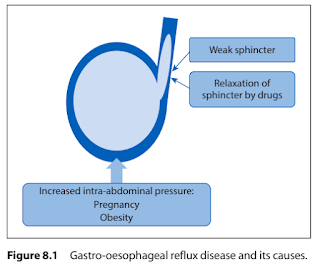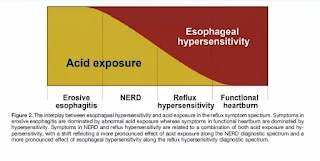Heartburn
Introduction
Heartburn is a form of dyspepsia, or more formally known as gastro-oesophageal reflux disease (GERD).
- Symptoms are caused when there is reflux of gastric contents, particularly acid, into the oesophagus, which irritate the sensitive mucosal surface (esophagitis).
Symptoms
Patients will often describe the symptoms of heartburn - typically a burning/pain felt in the stomach, passing upwards behind the breastbone (retrosternally).
- Regurgitation is defined as the perception of flow or refluxed gastric content into the mouth or hypopharynx.
- It is often brought on by bending or lying down, which make leakage of acid up the oesophagus more likely.
Aggravating Factors
Alcohol, caffeine, smoking, overweight, stress, a large meal and medications are known to aggravate heartburn.
Moreover, half of all pregnant women are estimated to suffer from heartburn (often begins in mid-to-late pregnancy).
Referral
Referral for further investigation is recommended:
- In patients aged <18 years or >55 years with recent onset symptoms.
- Sudden severe pain that radiates to the back and arms - heart attack?
- Pain wakes patient at night or pain shortly after eating (1-3 hours) - Ulcers?
- Difficulty in swallowing (dysphagia)
- Vomiting blood (haematemesis)
- A coffee ground appearance of vomitus is caused by coagulation and the presence of hematin, a dark pigment that forms when heme is oxidized by gastric acid the stomach.
- The presence of frank bloody emesis suggests moderate to severe that may be ongoing.
- Melenic stools - black and tarry stools indicate a bleed in the gastrointestinal tract.
- Failure to respond to antacids or symptoms have not responded to 2 weeks of PPI treatment - H. Pylori infection?
Pharmacological Management
An antacid or H2 receptor antagonist may be useful for symptomatic relief of mild, intermittent symptoms.
Antacids
- Neutralizing stomach acid.
- While liquid antacids typically work faster and have a greater neutralizing capacity, antacid tablets are more convenient.
- Antacids can affect the absorption of medications.
- Form a raft that sits on the surface of the stomach contents (i.e. above the acid pocket) to prevent reflux.
- Commonly combined with antacids.
Simethicone
- Simethicone is a mixture of liquid dimeticones containing finely divided silicon dioxide to enhance the defoaming properties of the silicon. Theoretically, it reduces surface tension and allows easier elimination of gas from the gut by passing flatus or eructation (belching).
- Evidence of benefit is uncertain. It is sometimes added to antacid formulations.
H2 antagonists, e.g. ranitidine, famotidine, cimetidine
- Group C poisons - pharmacist medicine
- Appear to equally as effective as antacids.
- Among all H2 antagonists, cimetidine is the most likely to be involved with drug interactions (e.g. with warfarin, phenytoin and theophylline) and has been associated with anti-androgenic effects such as gynecomastia, galactorrhoea, impotence and decreased libido.
Proton pump inhibitor
- Proton pump inhibitors (PPI) are the mainstay of treatment for patients with persistent symptoms of GERD.
- Relief may take several days for full effects; in the meantime a simple antacid might be used.
- If you read overseas community pharmacy references,
- A trial of proton pump inhibitor (PPI) is recommended as OTC treatment option for those who suffer from moderate to severe or recurrent symptoms.
- Referral is recommended if 2 weeks of continuous PPI therapy has failed to adequately control symptoms or symptoms continue to recur following an initial course of PPI therapy.
- At Malaysia, proton pump inhibitor falls under Group B poisons (prescription medicines).
Vonoprazan
- Vonoprazan, a potassium competitive acid blocker, has been widely studied in Japan where idiopathic peptic ulcer disease is often refractory to conventional PPI therapy.
- Vonoprazan may have high healing rates in this population (>80 percent healing), but is not available in many countries.
Prokinetic drugs, e.g. metoclopramide
- These agents facilitate the movement of gastric contents from the stomach to the duodenum. Metoclopramide acts locally to increase gastric motility and promote emptying and will provide symptomatic relief of "bloating".
- Prokinetic drugs are now rarely used and the use of metoclopramide is now restricted due to neurological side effects.
Lifestyle Modifications
Avoiding specific foods (such as coffee, alcohol, chocolate, cheese, fatty foods, citrus, carbonated beverages, spicy foods)
Avoiding late meals.
Avoiding late recumbency for 2-3 hours after meals.
Avoiding specific activities (such as smoking).
Elevation of the head of the bed.
Lose weight if overweight or obese.
Encourage relaxation strategies if stress and anxiety worsen symptoms.
NOTE: Oatmeal, a high-fiber food, can help absorb excess stomach acid and provide relief from heartburn. However, for some individuals with heartburn caused by bloating, avoiding oats may be beneficial. On the other hand, individuals who experience heartburn after consuming bread may find relief by avoiding bread made from gluten (such as wheat, barley, or rye), refined grains (like white bread), or those with certain toppings (like margarine, cheese, or spicy sauces).
Supplements
A 2020 systematic review summarises that probiotic use can be beneficial for GERD symptoms, but proper place-controlled, randomized and double-blinded clinical trials with a sufficient number of participants are warranted to conform its efficacy.
Curcumin in turmeric root has been used as a traditional remedy for indigestion.
Summary
While we may neglect our well-being during periods of good health, a healthy lifestyle is a crucial preventive measure against heartburn, a common condition in later life.
- Never let work take precedence over your health.
External Links
- NHS UK - Heartburn and acid reflux
- Rapid onset of effect of sodium alginate on gastro-oesophageal reflux compared with ranitidine and omeprazole, and relationship between symptoms and reflux episodes, 2006
- Unmet Needs in the Treatment of Gastroesophageal Reflux Disease, 2015
- Is the new potent acid-inhibitory drug vonoprazan effective for healing idiopathic peptic ulcers? A multicenter observational study in Akita Prefecture, Japan, 2019
- FDA Recalls All Ranitidine (Zantac) Products, Citing Increased Risk of Cancer, 2020
- Gastroesophageal Reflux Disease and Probiotics: A Systematic Review, 2020
- Consensus statements and recommendations on the management of mild‐to‐moderate gastroesophageal reflux disease in the Southeast Asian region, 2021



Is it okay for consumers/patients to take ppi on a long term basis?
ReplyDeleteIdeally, we would like to practice step down approach of PPI because of the long term adverse effects of PPI, such as osteoporosis, increased risk of CAP and CKD. The reason of referral for PPI treatment longer than 2 weeks is for doctor to rule out H pylori infection and other serious causes. In reality, though not ideal, there are patients who were on long term PPI (longer than 8 weeks).
Delete